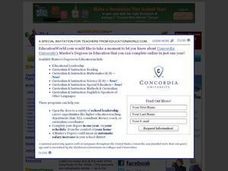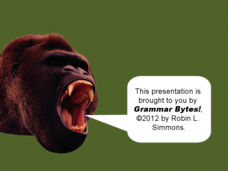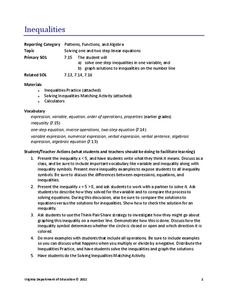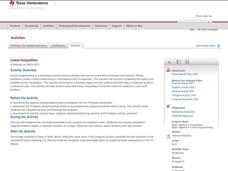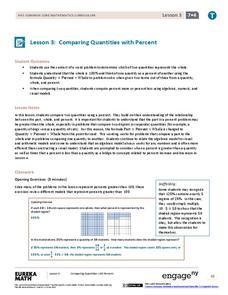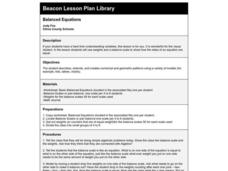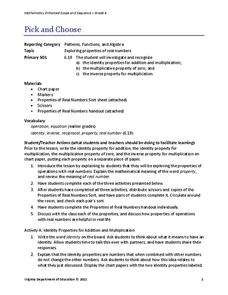Yummy Math
Going to the Game (systems)
Seven real-life math problems require the solving of simultaneous pairs of linear equations. Although a similar approach is taken for most of the problems, the topic of sports stadium concessions should keep the interest level high. As a...
Curated OER
Mystery Liquids: Linear Function
High schoolers determine the linear equations of the density of water and oil by collecting data on the mass of various volumes of each liquid. They construct scatter plots from the data and use these to write the linear equations for...
Curated OER
Gold Rush California and its Diverse Population
Students compare contemporary cultural differences with historical differences based on population percentage. In this cross-curriculum Gold Rush/math lesson, students analyze aspects of California's Gold Rush population and diversity...
Curated OER
How to Implement Project Based Learning to Engage Students
Can a math teacher employ project-based learning? Learn how one great math teacher uses PBL to design math projects that provide learners with a more challenging and holistic learning experience. A wonderful article, that includes three...
Curated OER
Grammar Bytes: Adjectives and Adverbs
Using a format similar to what students may see on standardized tests, this presentation discusses the proper use of adjectives and adverbs. The examples focus on some of the most common errors, including the use of the words poorly and...
Curated OER
Help Young Mathematicians Write Their Way to Math Success
Clear and concise writing should be an integral part of learning mathematics.
Mathematics Assessment Project
Solving Linear Equations in One Variable
A thorough and professional appearance characterizes a lesson on linear equations. Maturing mathematicians are taught to identify and exemplify linear equations with a single variable. They also classify equations according to the number...
National Security Agency
Growing Patterns: Practical Pattern Problems
Your learners explore growing patterns by describing, extending, creating, and evaluating practical pattern problems in this three-day collaborative unit. Beginning with concrete patterns and function tables to extend and describe with a...
Virginia Department of Education
Inequalities
Not all resources are created equal — and your class benefits! Scholars learn how to solve one-step inequalities using inverse operations. They complete an activity matching inequalities to their solutions.
Inside Mathematics
Graphs (2004)
Show your pupils that perimeter is linear and area is quadratic in nature with a short assessment task that requests learners to connect the graph and equation to a description about perimeter or area. Scholars then provide a...
Curated OER
Roman Bernardo: Solving Linear Equations
Mathematicians use an inquiry method to solve linear equations. In this linear equations instructional activity, students practice solving equations using addition, subtraction, multiplication and division. They solve multi-step...
Curated OER
Linear Inequalities
Through exploration of linear programming through graphs and equations of inequalities, learners relate linear programming to real life scenarios, such as business. Graphing and shading is also part of this exercise.
Inside Mathematics
Graphs (2006)
When told to describe a line, do your pupils list its color, length, and which side is high or low? Use a worksheet that engages scholars to properly label line graphs. It then requests two applied reasoning answers.
Inside Mathematics
Snakes
Get a line on the snakes. The assessment task requires the class to determine the species of unknown snakes based upon collected data. Individuals analyze two scatter plots and determine the most likely species for five additional data...
Inside Mathematics
Population
Population density, it is not all that it is plotted to be. Pupils analyze a scatter plot of population versus area for some of the states in the US. The class members respond to eight questions about the graph, specific points and...
Mathematics Vision Project
Module 7: Modeling with Functions
The sky's the limit of what you create when combining functions! The module begins with a review of transformations of parent functions and then moves to combining different function types using addition, subtraction, and multiplication....
EngageNY
Vectors and the Equation of a Line
Represent linear equations in both two and three dimensions using parametric equations. Learners write parametric equations for linear equations in both two and three variables. They graph and convert the parametric equations to...
02 x 02 Worksheets
Inverse Variation
Discover an inverse variation pattern. A simple lesson plan design allows learners to explore a nonlinear pattern. Scholars analyze a distance, speed, and time relationship through tables and graphs. Eventually, they write an equation to...
EngageNY
Comparing Quantities with Percent
Be 100 percent confident who has the most and by how much. Pupils use percentages to help make the comparisons by finding what percent one quantity is of the other. They also determine the percent differences between the two quantities.
Curated OER
Balanced Equations
Help your math class understand variables. This activity is for a visual learner. They will use weights and a balance scale to show how the sides of an equation are equal. Worksheet is included.
Illustrative Mathematics
US Garbage, Version 1
An interesting example of a discrete function and how it is applies to the real world. This could easily make a good collaborative lesson plan with an environmental science class. Practice reading a table and drawing a scatter plot make...
Virginia Department of Education
Determining Direct Variation
Once learners realize what direct variation is, they see it's just a type of linear function. The activity poses a general question that leads to the creation of the y = kx formula. The resource includes discussion prompts and ideas for...
Radford University
Parallel Lines, Transversals, and Angles: What’s the Connection?
Streets, bridges, and intersections, oh my! Parallel lines and transversals are a present in the world around us. Learners begin by discovering the relationship of the angles formed by parallel lines and a transversal. They then apply...
Virginia Department of Education
Pick and Choose
Properly teach properties with three activities that allow learners to investigate properties of real numbers. The resource covers the identity properties for addition and multiplication, the inverse property for multiplication, and the...
Other popular searches
- Patterns Algebraic Thinking
- Algebraic Reasoning Unit
- Patterns, Algebraic Thinking
- Tiles Algebraic Thinking
- Algebraic Thinking in Music
- Algebraic Thinking Graphing
- Basic Algebraic Reasoning
- Algebraic Thinking Textbooks
- Algebraic Thinking/pattern
- Algebraic Thinking Part 2
- Algebraic Reasoning Assessment




